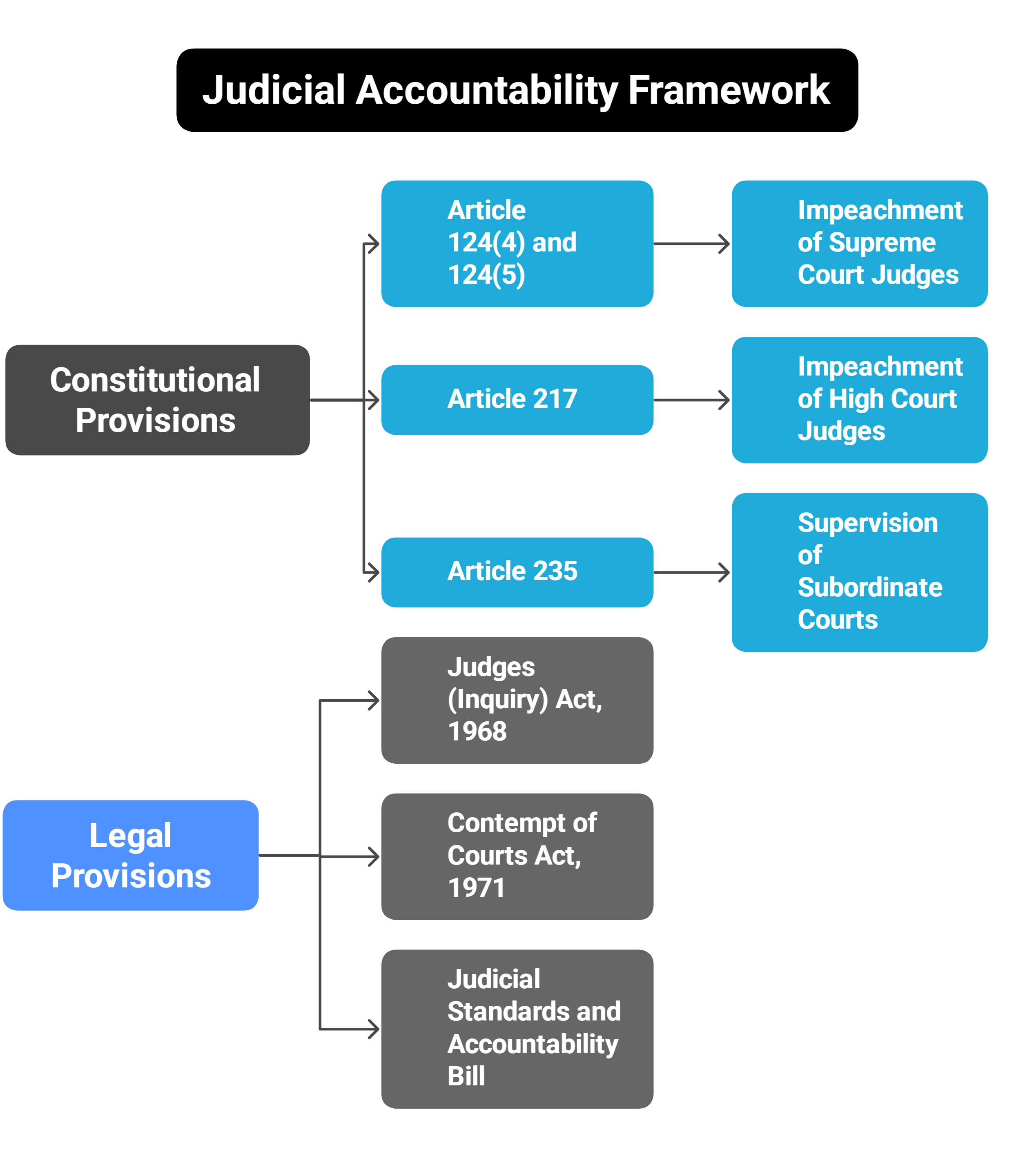Context:
Recently, Rajya Sabha Chairman Jagdeep Dhankhar discussed judicial accountability in the Rajya Sabha. This discussion took place in the context of growing concerns about transparency following allegations of cash being recovered from the residence of a High Court judge.
What is Judicial Accountability?
Judicial accountability refers to the principle that judges must be answerable for their decisions and actions. It ensures that the judiciary operates transparently, maintaining fairness and upholding the rule of law. Judges are required to act in accordance with legal principles, as they are entrusted with the power to deliver justice on behalf of society.
Provisions for Judicial Accountability
Constitutional Provisions:
-
- Article 124(4) and 124(5): Provide grounds for impeachment of Supreme Court judges for proven misbehaviour or incapacity.
- Article 217: Similar provisions for impeaching High Court judges.
- Article 235: Empowers High Courts to supervise and control subordinate courts.
- Article 124(4) and 124(5): Provide grounds for impeachment of Supreme Court judges for proven misbehaviour or incapacity.
Legal Provisions:
-
- Judges (Inquiry) Act, 1968: Establishes a mechanism for investigating judicial misconduct through a three-member panel.
- Contempt of Courts Act, 1971: Protects the judiciary from undue influence, ensuring its independence.
- Judicial Standards and Accountability Bill (pending): Aims to improve transparency and oversight mechanisms in the judiciary.
- Judges (Inquiry) Act, 1968: Establishes a mechanism for investigating judicial misconduct through a three-member panel.

Need for Judicial Accountability
-
- Ensuring Public Trust: Maintaining the credibility of the judiciary, which is vital for the public’s confidence in the legal system.
- Preventing Misconduct: Encouraging judges to adhere to ethical standards and constitutional principles.
- Enhancing Transparency: Judicial decisions should be open to scrutiny to foster fairness.
- Balancing Independence and Responsibility: Ensures that judicial independence is not misused for personal or political gain.
- Promoting Rule of Law: Ensures that decisions are unbiased, fair, and consistent with constitutional mandates.
- Ensuring Public Trust: Maintaining the credibility of the judiciary, which is vital for the public’s confidence in the legal system.
National Judicial Appointments Commission (NJAC) Act
Reflecting on the long-standing debate on judicial appointments, Dhankhar highlighted the now-defunct NJAC Act, which was struck down by the Supreme Court in 2015.
The Act, aimed at reforming judicial appointments, has been a subject of contention. Dhankhar suggested that a structured discussion with Rajya Sabha floor leaders would be organized soon to address the legacy of the NJAC Act and explore reforms in judicial appointments.
Way Forward:
-
- Legislative Reforms: Urgently passing the Judicial Standards and Accountability Bill to strengthen judicial oversight mechanisms.
- Strengthening Internal Mechanisms: Creating independent judicial review bodies to ensure proper conduct within the judiciary.
- Codifying Ethical Guidelines: Expanding and enforcing the Restatement of Judicial Values for a clearer code of conduct.
- Public Scrutiny: Encouraging transparency through the publication of judicial decisions and activities.
- Training and Awareness: Conducting regular training for judges on ethical principles and constitutional values to uphold accountability.
- Legislative Reforms: Urgently passing the Judicial Standards and Accountability Bill to strengthen judicial oversight mechanisms.







